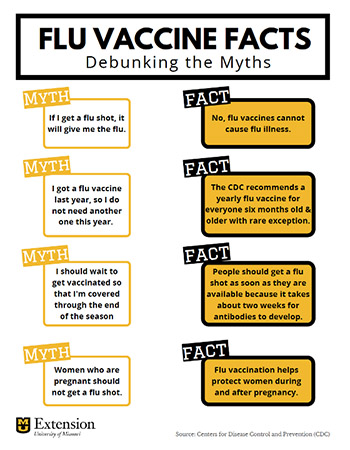
English (PDF)
Spanish (PDF)
A common misconception (Misconception #1) is getting influenza is less harmful than getting the influenza vaccination. While the influenza vaccination may cause minimal side effects, the risk of contracting influenza without any immunity may increase the risk of severe illness in those with underlying health conditions such as asthma, diabetes, and heart disease.
This page helps debunk common myths and misconceptions so Missourians can be informed and educated on the health choices they would like to make.
Common Misconception #2: The flu vaccination is grown in a lab, so it must be a pharmaceutical scam.
Fact: Inactive viruses are grown in a lab. The virus is then killed. Flu vaccines contain the dead virus. While grown in a lab, the influenza shot is not a pharmaceutical scam. The influenza vaccination prevents individuals from an increased risk of serious illness which would require extensive treatment and medication.
Common Misconception #3: I got a flu shot last year, but still ended up getting influenza.
Fact: There could be several reasons for this scenario. No flu vaccine is perfect, so its possible that the flu vaccine did not "work". Circulating flu strains differ from year to year so the vaccine may not have been a good "match". It takes a few weeks to build immunity after your flu shot, so if you are exposed to the flu in the meantime, you might still catch it. Some people mistake colds for the flu. The flu shot does not prevent infection from cold viruses, nor can it cause you to catch a cold. All in all, even though the flu shot is not perfect, it is our best defense for controlling influenza for ourselves, our families and our communities.
Common Misconception #4:The flu vaccination is made up of harmful ingredients such as formaldehyde and thimerosal.
Fact: Data shows that while these ingredients are used to preserve and make the vaccination effective, they come in such tiny amounts that they are not harmful to receive in the vaccination.